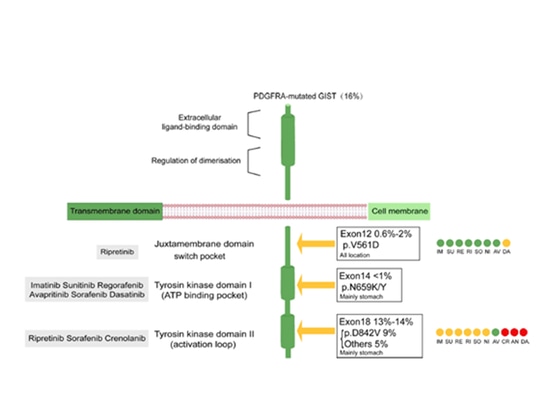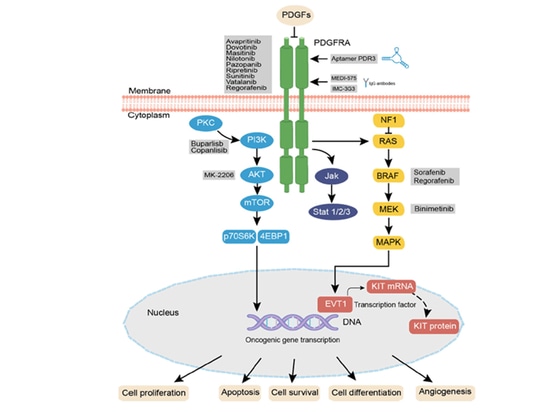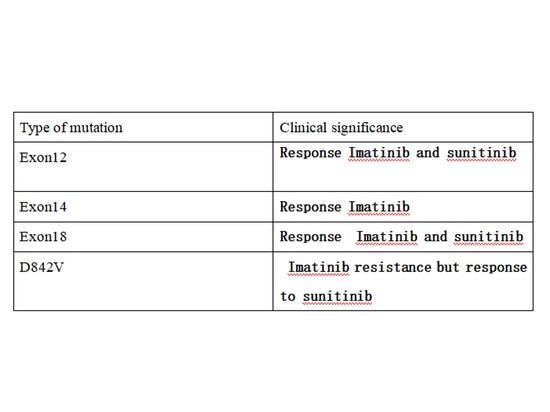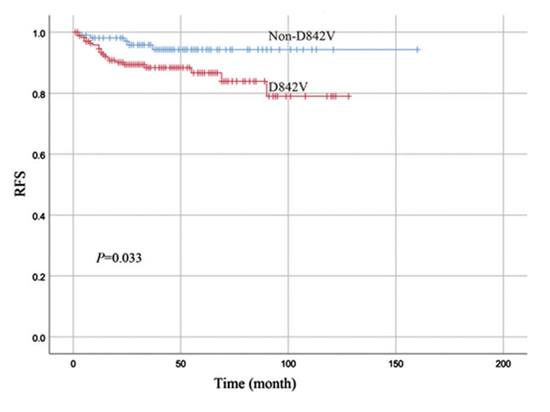
#Industry News
The Important Role of PDGFRA in the Pathogenesis of Gastrointestinal Stromal Tumors (GISTs)
The Important Role of PDGFRA in the Pathogenesis of Gastrointestinal Stromal Tumors (GISTs)
Background:
Gastrointestinal Stromal Tumors (GISTs) are gastrointestinal mesenchymal tumors that commonly originate from the digestive tract. They are characterized by their morphology and typically show positivity for CD117 (c-kit). The activation mutations of the KIT or PDGFRA genes are the main drivers of GIST development. GISTs are most commonly found in the stomach (60%), followed by the small intestine (jejunum and ileum, 30%), duodenum (5%), rectum (2-3%), and colon (1-2%). The occurrence of GISTs in the esophagus is much less frequent (<1%), and a small number can occur in extraintestinal locations such as the greater omentum, mesentery, pelvis, and retroperitoneum. Most studies report an annual incidence rate of GISTs ranging from 10 to 15 cases per million. The most common mutations in GISTs are those of the KIT gene and PDGFRA gene. The platelet-derived growth factor receptor alpha (PDGFRA) gene encodes a receptor tyrosine kinase that binds to its corresponding ligands and plays a crucial regulatory role in embryonic development, cell proliferation, survival, and chemotaxis processes.
Introduction to PDGFRA:
PDGF (Platelet-Derived Growth Factor) was initially discovered in the process of platelet activation. Its receptors, PDGFRA and PDGFRB, have similar structures and undergo intracellular activation and secretion during cellular membrane transport. PDGFR consists of an extracellular ligand-binding domain, a single transmembrane region, and an intracellular tyrosine kinase domain. This dual switch mechanism precisely regulates the activity of the cellular kinase by controlling the conformation of the kinase. On one hand, the switch control of the kinase conformation is mediated by the phosphorylation of one or more amino acids, which can "turn on" or "turn off" the kinase. Most primary and secondary resistance mutations in PDGFRA are located within the conformation control switch region of the intracellular kinase domain. Primary mutations are frequently found in the activation loop, while secondary mutations typically occur in the ATP-binding domain (exon 14) or activation loop (exon 18). Mutations in PDGFRA are mainly observed in exons 18 and 12, and rarely in exon 14. Mutations in exon 18, which encodes the D842V site, account for approximately 80% of PDGFRA mutations in GISTs. Apart from the D842V mutation in exon 18, which is a resistant mutation, all other mutations are sensitive to imatinib. Studies have found that the D842V mutation in the PDGFRA gene is responsible for primary resistance to imatinib in GIST patients. PDGFRA mutations are independent of C-KIT gene mutations. Therefore, testing for PDGFRA gene mutations in tumor patients can be used to determine the efficacy of imatinib treatment.
Figure 1: Overview of Specific PDGFRA Mutations
The PDGFR signaling pathway is an important receptor tyrosine kinase pathway that is involved in the physiological activities of various tumors [10]. PDGFR is a transmembrane glycoprotein dimer that, upon binding to PDGF ligands, initiates dimerization and phosphorylation, thereby activating various downstream signaling pathways, such as the phosphoinositide 3-kinase (PI3K)/protein kinase B (AKT/PKB) pathway, the mitogen-activated protein kinase (MAPK)/extracellular signal-regulated kinase (ERK) pathway, and the JAK-STAT pathway [11-12]. Inhibiting PDGFR can reduce cancer proliferation, metastasis, invasion, and angiogenesis, and improve the anti-tumor effects of anticancer drugs [13-14]. Currently, there are several therapeutic strategies being studied that target this signaling pathway.
Figure 2: PDGFRA Signaling Pathway and Current Therapeutic Strategies
Clinical Significance
01. Treatment Response Evaluation
On January 9, 2020, the U.S. Food and Drug Administration (FDA) approved Ayvakit (avapritinib) for the treatment of adult patients with unresectable (cannot be removed by surgery) or metastatic (cancer cells have spread to other parts of the body) gastrointestinal stromal tumors (GISTs) carrying platelet-derived growth factor receptor alpha (PDGFRA) exon 18 mutations, including the most common exon 18 mutation type, PDGFRA D842V. Currently, common amino acid changes found in GISTs include:
02.Prognostic assessment:
Researchers have explored the prognostic differences between patients with D842V mutation and non-D842V mutation in PDGFRA-mutated GISTs. The study included 280 patients, with 172 (61.4%) having the D842V mutation and 108 (38.6%) having non-D842V mutations. The study found that the 1-year, 3-year, and 5-year recurrence-free survival (RFS) rates for patients with D842V mutation were 94.6%, 88.3%, and 86.6%, respectively, while for patients with non-D842V mutations, the rates were 98.1%, 95.8%, and 94.3%, respectively. Patients with non-D842V mutations had a better prognosis (P=0.033).
Figure 3: Differential Prognosis of PDGFRA Mutations at Different Locations
Reference:
[1] Poveda A, et al. GEIS guidelines for gastrointestinal sarcomas (GIST). Cancer Treat Rev. 2017;55:107-119.
[2] Søreide K, et al. Global epidemiology of gastrointestinal stromal tumours (GIST): A systematic review of population-based cohort studies. Cancer Epidemiol. 2016;40:39-46.
[3] Fredriksson L, Li H, Eriksson U. The PDGF family: four gene products form five dimeric isoforms. Cytokine Growth Factor Rev (2004) 15(4):197–204.
[4] Kazlauskas A. PDGFs and their receptors. Gene (2017) 614:1–7.
[5] Heldin CH. Targeting the PDGF signaling pathway in tumor treatment. CellCommun Signal (2013) 11:97.
[6] Huse M, Kuriyan J. The conformational plasticity of protein kinases. Cell.(2002) 109(3):275–82.
[7] Cassier PA, Ducimetiere F, Lurkin A, Ranchere-Vince D, Scoazec JY, Bringuier PP, et al. A prospective epidemiological study of new incident GISTs during two consecutive years in Rhone alpes region: incidence and molecular distribution of GIST in a European region. Br J Cancer (2010) 103(2):165–70.
[8] Corless CL, Barnett CM, Heinrich MC. Gastrointestinal stromal tumours: origin and molecular oncology. Nat Rev Cancer (2011) 11(12):865–78.
[9] Martin-Broto J, Martinez-Marin V, Serrano C, Hindi N, Lopez-Guerrero JA, Bisculoa M, et al. Gastrointestinal stromal tumors (GISTs): SEAP-SEOM consensus on pathologic and molecular diagnosis. Clin Transl Oncol (2017) 19(5):536–45.
[10] Cavalcanti E, Ignazzi A, De Michele F, Caruso ML. PDGFRalpha expressionas a novel therapeutic marker in well-differentiated neuroendocrine tumors. Cancer Biol Ther (2019) 20(4):423–30.
[11] Zou X, Tang XY, Qu ZY, Sun ZW, Ji CF, Li YJ, et al. Targeting the PDGF/PDGFR signaling pathway for cancer therapy: A review. Int J Biol Macromol (2022)202:539–57.
[12] Huang XL, Khan MI, Wang J, Ali R, Ali SW, Zahra QU, et al. Role of receptor tyrosine kinases mediated signal transduction pathways in tumor growth and angiogenesis-new insight and futuristic vision. Int J Biol Macromol (2021) 180:739–52.
[13] Thies KA, Hammer AM, Hildreth BE3rd, Steck SA, Spehar JM, Kladney RD,etal. Stromal platelet-derived growth factor receptor-beta signaling promotes breast cancer metastasis in the brain. Cancer Res (2021) 81(3):606–18.
[14] Balamurugan K, Koehler L, Durig JN, Hempel U, Rademann J, Hintze V,etal. Structural insights into the modulation of PDGF/PDGFR-beta complexation.
[15]. Zhang P, Wang M, Li J, Gao X, Zhang B, Liang H, Zhou Y, Liao G, Feng F, Zhou Y, Yu J, Zhang J, Zhou Y, Ye Y, Chen J, Zhao Q, Shen K, Cao H, Tao K. Clinicopathologic Characteristics and Prognosis of PDGFRA-Mutant Gastrointestinal Stromal Tumors: A Large-Scale, Multi-Institutional, Observational Study in China. Adv Ther. 2022 Jun;39(6):2920-2931.
[16] Chinese Society of Clinical Oncology Gastrointestinal Stromal Tumor Expert Committee, et al. "Consensus of Chinese Experts on Gene Testing and Clinical Application of Gastrointestinal Stromal Tumors (2021 Edition)." Chinese Journal of Clinical Oncology. 2021;26(10):920-927.
Disclaimer: This article is solely for sharing purposes and does not represent the platform's stance. If there are any copyright or other issues, please contact us immediately, and we will make the necessary corrections promptly. Thank you!








